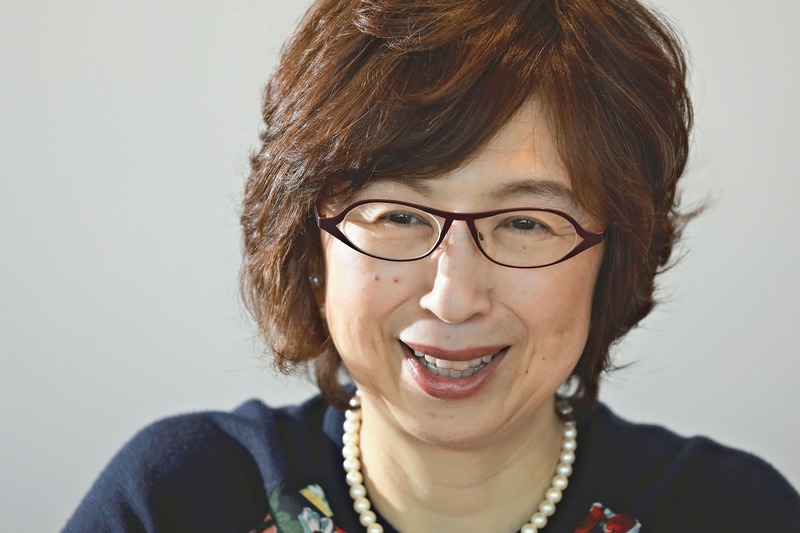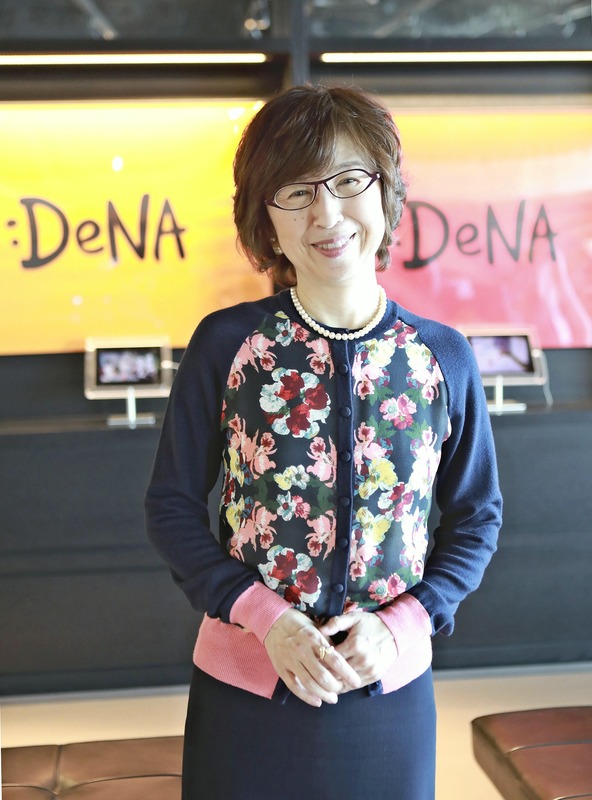
Major IT company DeNA Co. has achieved rapid growth mainly through gaming businesses such as Mobage. For this installment of The Leaders, a column featuring corporate management and senior executives, The Yomiuri Shimbun asked DeNA founder and Executive Chairman Tomoko Namba how the company can expand its business in a society being transformed by the IT revolution.
We want to bring delight to the world, the kind that naturally bubbles up and brightens one's face. That is the biggest theme for DeNA as a company. We were previously focused on the world of games and the internet, but now we're beginning to make the leap into other fields. One such example is the strengthening of our sports business.

[In 2011, DeNA acquired the then Yokohama BayStars. In 2015, Namba became the first woman to take over as the owner of a professional baseball team.]
The initiative to buy a baseball team was taken not by me, but by then chairman Makoto Haruta, who became the first owner. He built all the necessary foundations. After that, he left the company to start a new business, so I took over as the second owner.
I want to mold the team into a form in which it can develop and flourish without being influenced by the ups and downs of the company that owns it. There is an idea of companies supporting and nurturing sports in a "tanimachi" patron style [like we see in the sumo world.] However, I believe that it's possible for companies to realize growth in a sports business on an enlarged scale by firmly increasing profits in professional baseball and investing in it further.
The reform needed for that came with the 2016 friendly acquisition of the managing company of Yokohama Stadium. This enabled the unified management of both the team and the stadium. Although it was a project led by DeNA headquarters, we were only able to implement it thanks to the understanding and cooperation of the local people.
We gained a greater degree of freedom through event management using the facilities and the development of new advertising media. We'd always had cooperation before, but when the management was unified, it made it possible to move more flexibly and join forces to work toward maximizing profits.
We were able to streamline by consolidating sales departments, which allowed us to concentrate on strengthening other fields. We were also able to make the BayStars profitable. The number of spectators in attendance has increased, so we'll install an extra 6,000 seats before 2020 when the Tokyo Olympic Games will be held.
Possessing stadium facilities can also contribute to the vitalization of a city. I feel we've expanded into new business horizons.
Female perspective on services
Many aspects of the baseball business should be learned from the major leagues in the United States, but there are also many interesting facets of baseball that are unique to Japan.
I've attended baseball games overseas, but there's a different kind of enjoyment in the participatory support of the Japanese people, which reveals a sense of unity. There's also a depth displayed in the teamwork and tactics, what you might call a "small-ball strategy."
At the Pyeongchang Winter Olympics, I was moved by the speed skating team pursuit. Individually and physically, we were no match for the Netherlands, but the Japanese team was able to win through teamwork and tactics. Baseball is similar, too. I want to convey that thrill to as many people as possible.
On the other hand, the way people enjoy baseball is changing compared to the old days. In the past, it was mainly watched on TV, on commercial stations, but broadcast media has diversified since those days. It's also important to get people into the stadium. What strategies should we adopt?
We're always making various suggestions, even for the minute service details at the stadium. I'm fairly sensitive to the cleanliness of bathrooms, so whatever event I go to, the first thing I always do is check the bathrooms. When our company entered the world of professional baseball, I had the stadium bathrooms spruced up.
I also hate waiting in line. I want the lines at cash registers and other places to be shortened. The alcohol available at the stadium is mainly beer, but some people want to drink wine or champagne. I want to improve services by looking at them from a female perspective.
We also have a long-distance track-and-field team, and will start managing a professional basketball team from July. I felt again at the Pyeongchang Winter Olympics that sports truly are the best thing that people can share together with joy. That gives it great potential.
Firm's 'second founding'
Prior to founding DeNA, I worked at a foreign consultant company. Once when I was working there, I proposed an internet auction site. The words spoken by one company president changed my life.
This person said, "Since you speak so enthusiastically about the idea, you should do it yourself."
"Do it myself?" I'd never even considered such a thing. "Ah, that would be great," I thought, then suddenly, as if possessed by something, I took the plunge into entrepreneurship.
But I suffered many hardships from the outset. Just before launching the auction site, I learned that the system development that had been outsourced had not progressed at all. I hastily found other developers, but ended up having to launch it in an unfinished state from which it was not possible to list goods for sale. Since then, I insist on carrying out system development in-house.
In 2010, Yahoo Mobage, a games site that we had started in partnership with Yahoo, suffered a major system failure. The worst thing was the trouble it caused for our partners.
[In 2017, a great deal of copyright infringement and erroneous information was discovered on curated information sites offered by DeNA. Namba assumed the position of executive chairman with representative director authority, which created a two-representative director system with company president Isao Moriyasu.]
For compliance, it is not enough to merely give orders and create rules. If we do not have the ability to thoroughly check whether they are being followed, then we cannot call ourselves a true first-rate company. I went back in order to regain trust in the company with responsibility.
I want to do everything in my power with the lessons learned from those problems so that people will say DeNA became a better company as a result of them.
My motto is "failure is the springboard to success." At DeNA, people who have given it their all and went through many setbacks will always be given another chance even if they fail. Success owes a lot to luck, but failure generally has a reason behind it. That is where there is a chance to learn something.
I also want to attempt new things in the future without fear of failure. Besides sports, we are also engaged in the fields of autonomous driving and health care. The time and funds required in these areas are completely different from the internet domain. It is also necessary to physically ensure people's safety and well-being. We grow by absorbing different things. This can surely be described as our "second founding" after the company first began.
With the progress of information technology and the spread of artificial intelligence, a huge shake-up is currently occurring in our society. There's a limit to what one company can achieve, but if we combine our company, which has experts in the internet, with existing businesses, we can provide much more satisfying and convenient services. We'll also be able to spread delight further through the world. I believe we're now living in a very interesting time.
--Tomoko Namba / Founder and Executive Chairman of DeNA Co.
Namba was born in 1962 in Niigata Prefecture. She graduated from Tsuda University in 1986 and joined the Japanese subsidiary of U.S. management consulting firm McKinsey & Co. In 1999, she founded DeNA. In 2011, she stepped down as president to care for her sick husband, but remained as a board member. In 2015, Namba became the owner of the Yokohama DeNA BayStars. She assumed the position of executive chairman in March 2017.
--Key Numbers: 143.8 billion yen.
Consolidated sales for the business year ended March 2017 amounted to a total of 143.8 billion yen, which, at an increase of 100 million yen from the previous year, remains stable. However, DeNA lost its grip slightly on the games business, with revenue falling by 7 percent to 101.4 billion yen, so the challenge now lies in increasing revenue in non-games-related spheres. Their sports business grew by 39 percent, owing to the popularity of the BayStars. DeNA now has 2,400 employees in total (as of the end of March 2017).
Read more from The Japan News at https://japannews.yomiuri.co.jp/







